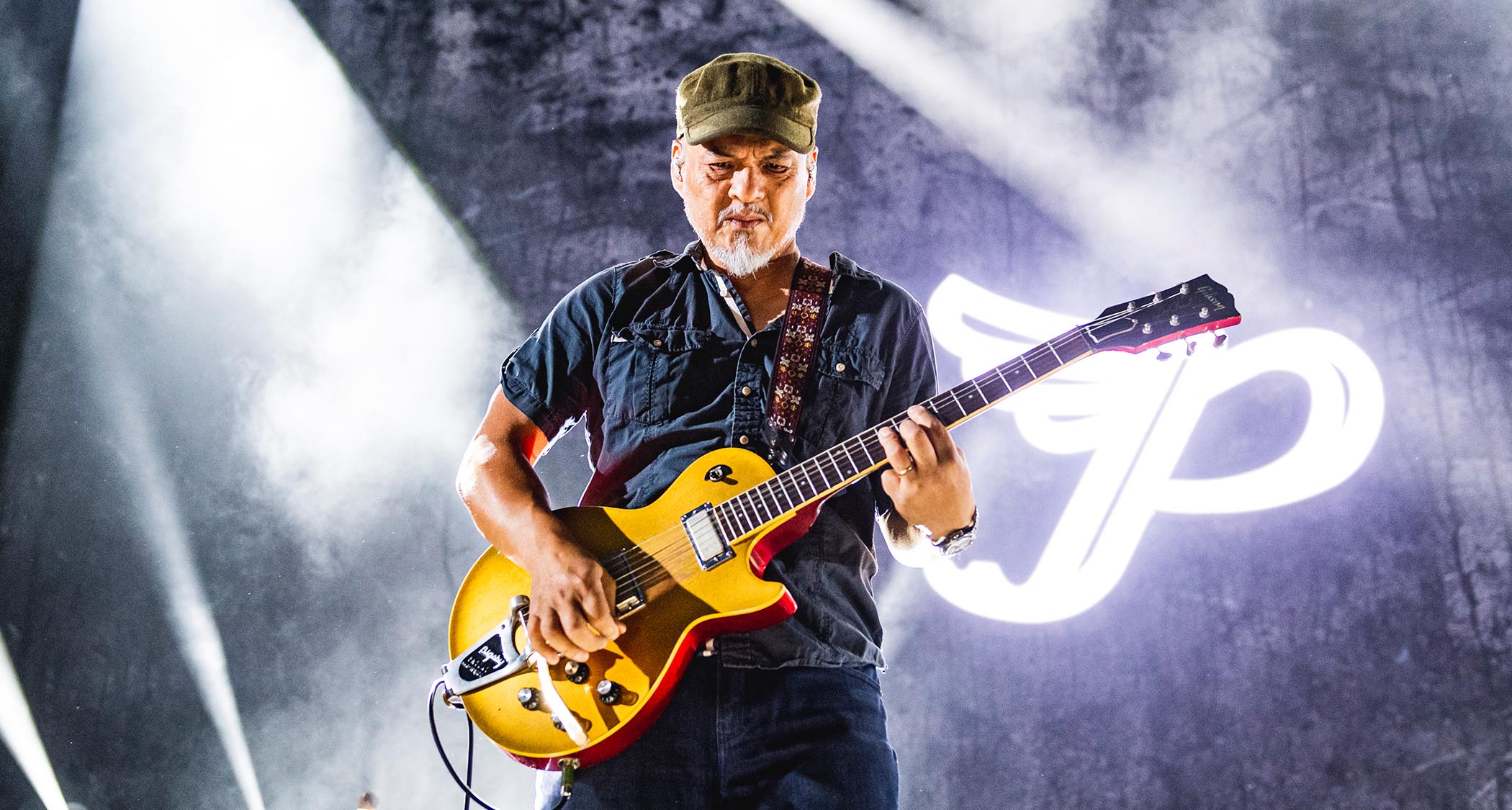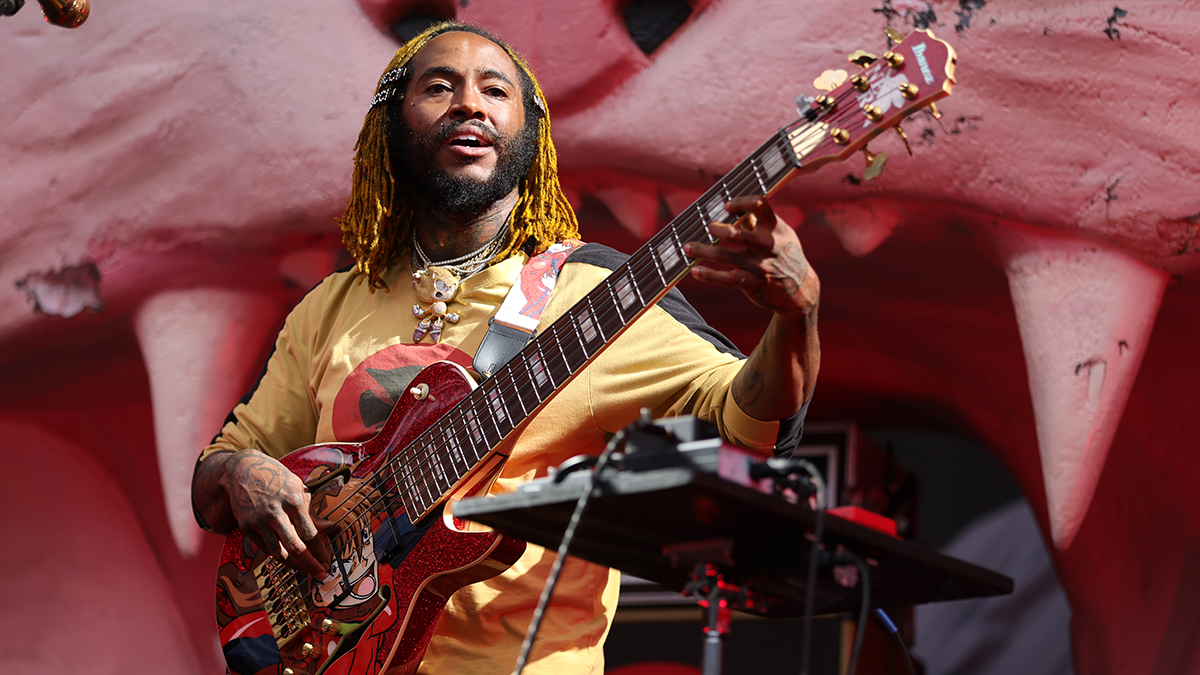“I don’t trespass on people’s style. It’s like, ‘Oh, God, you sound like that guy... Why?’ We’ve already seen that painting, don’t do that. It’s boring”: Pixies guitarist Joey Santiago on living life as an outsider guitar hero
Long ago, the Pixies blazed a trail for Nirvana and others to follow. But now, as before, there is no masterplan. As guitarist Joey Santiago says: “I still go by feel – and with my gut”

All the latest guitar news, interviews, lessons, reviews, deals and more, direct to your inbox!
You are now subscribed
Your newsletter sign-up was successful
Nirvana. Radiohead. Weezer. All have the Pixies’ weird-out/freak-out signature stamped across their foreheads. Formed in Boston, Massachusetts in 1986, Pixies changed the alt-rock game forever with the classic albums Surfer Rosa (1988), Doolittle (1990) and Bossanova (1990) with era-defining songs such as Where Is My Mind?, Here Comes Your Man and Debaser.
The mad scientist behind the bulk of that indie rock splendour is guitarist and lead vocalist Charles Michael Kittridge Thompson IV, aka Frank Black, aka Black Francis. A lyrical savant and a master of loud/quiet dynamics, Francis set the template for ’90s rock, which has been copied endlessly across the years. But he couldn’t have done it without his trusted sidekick Joey Santiago, who injected gain-drenched, off-the-wall, shards-of-glass-meets-sticky-pop guitar goodness into the mix.
As Joey tells TG, the Pixies’ approach as always been about “feel” in its purest sense. “I knew what was overdone,” he says. “And I knew what people could do better than I could, so I steered away. But now, I’m learning more theory, which has been interesting…”
Starting with the 2022 album Doggerel, Francis began to lean on Joey for not only guitars but also lyrics. Joey cautiously, if not jokingly, attributes this to Francis’s “thinking the way I look at the world is interesting”.
The results on Doggerel were strong, but even stronger on the band’s new album The Night The Zombies Came, with the classically-inspired I Hear You Mary being a Santiago-penned standout.
Joey admits that the Pixies’ earlier catalogue looms large. And he’s not about to proclaim that The Night The Zombies Came is their best yet. Sure, he’s happy with it, but he still yearns to complete a magnum opus.
As he puts it: “I want people to one day say about the post-break-up records, ‘These are great records, just as good as the earlier ones’. I want to make one definitive album where it’s like, ‘Fuck… okay, that’s it!’”
All the latest guitar news, interviews, lessons, reviews, deals and more, direct to your inbox!
But for now, he’s got plenty to say about the new album, starting with his expanded role in the band…
You’re writing words for Black Francis to sing. Is that a pretty daunting task?
“Going back to our heyday, nothing was really broken. I was quite happy doing what I was doing – and I’m still happy. If I don’t have to write again, I’ll be happy. The lyrical aspect is a great and fun exercise. But I consider Charles [Black Francis] one of the best lyricists. Music is one thing, but his lyrics are like, ‘What the fuck?’ You know?”
Why do you think Francis has asked you to contribute lyrics at this stage of the game?
“I have no idea! Maybe he thinks the way I look at the world is quite entertaining. That’s the only reason that I can think of. But I really don’t know, man.”
So how do you look at the world?
“Oh, man… it’s a fucking goofy world. It really is. It’s like this parade of people. It’s just the weird way the world ended up.”
How does the state of the world, combined with what’s expected of the Pixies, inform how you approach making new records?
“Once we’re in the studio, it’s all just whatever happens. Musically, I feel kind of trapped within the parameters and the rules of music. I navigate around that. I’m fortunate enough to have carved out this style that comes out naturally, and I’m aware of it. Sometimes I avoid it, and sometimes I embrace it. I don’t know if I answered your question…”
Let’s try it this way: what are your default settings when you pick up the guitar while in Pixies mode?
“I fool around with the guitar, and I’ve been fooling around with it a lot more. What comes to mind is that I like to make a story out of it. When I’m watching a TV programme with my wife, I tend to score the scenes. It’s just exercising another part of my brain.”
Would you say inspiration usually strikes randomly for you?
“It comes out of the ether. Sometimes it’s two notes that will start everything, and it will snowball from there. It will come from the ether, and then, I’ll be like, ‘Okay, I want this to be like David Gilmour-ish’, or whatever it is. Most of the time, it’ll just come out of nowhere.”
Digging into The Night The Zombies Came, as we understand it, I Hear You Mary came from an instrumental track that you put together which was inspired by classical guitar. Is that correct?
“During Covid, I bought a nice acoustic guitar and started to learn [1968 Mason Williams instrumental] Classical Gas. Along the way, this thing – I Hear You Mary – came along. I was listening to Classical Gas, and just the technique and the alternative picking were there. I kept fooling around with it, and this thing came along.”
Your style is totally fearless. You’re unafraid to go anywhere on guitar. But does it creep into your mind that injecting classical touches might alter your guitar identity?
“That’s a good question. Subconsciously, as far as my style goes, I’ve always been like, ‘Okay, I don’t think anyone else is doing this. And if they are, they’d be stupid – I just stuck to it’. And then, in my head, I was like, ‘If I learn more, I’m gonna f*ck everything up!’ I already knew a bunch of stuff as a kid. I knew all the scales and stuff and the pentatonics, but that was boring for me.”
So it’s a matter of merging your idiosyncrasies with theory.
“In a way, yes. When I’m learning it, there’s some kind of theory, like modes, for instance. But what I’ve discovered is that I’ve been doing this already. I kind of already knew what I was doing and knew certain modes would provoke feelings, but – for me – I had to discover it naturally.
“In the end, it’s all feeling anyway. I discovered these things by feel because sometimes there’s a shortcut if you want a certain feeling. There’s a shortcut to do that, but I’ve found that now I don’t find that satisfying. But I’ll still go by feel – and with my gut.”
Which track from the new album would you pick as the blending of your quintessential vibe with your newfound chops?
“The end of the Chicken solo is straight pentatonic, which I would have avoided in the past like the plague! But I like the pace of it. I got the David Gilmour pace.”
Modeling is what it is, but without my amps there’d be nothing to model
Have you brought any new gear into the fray to support your new outlook?
“I’ve had my Marshall JCM800 for a long time. It’s a 50-watt, two-channel one. I like to use its natural distortion. But then I’ve had a blackface ’64 Fender Vibrolux for a while now, too. That’s the one that just punches through and gets the transience. The Marshall is just the wolf behind it.”
Do you use the same gear live as in the studio?
“Well, that’s my setup for live. In the studio, I want to use the same gear so it will translate live.”
So no amp modelling for you, then?
“I haven’t tried them. I do have one at home, but I don’t know – there’s something about the feeling of the amp behind you. We’ve played with bands that use modelling, and it sounds fine to me, but I just think the romance of real amps is there. Modelling is what it is, but without my amps there’d be nothing to model.”
The Pixies have never been into following trends anyway…
“We never listen to any of that outside stuff that influences you one way or another. When someone tells me, ‘Have you listened to this band? They kind of sound like you guys’ – I will avoid listening to that.
“We were never a trendy band. Deep down, we feel like outsiders. We never fit into a scene. When we were in Boston, I definitely felt like an outsider. I did go to a handful of parties where other musicians were, but I did not feel the vibe!”
That’s why your style is unlike anything else out there. It’s all internal.
“Internal, yes. When I listen to music, I listen for the mood. I’ll get some sonic influences from it, but I don’t trespass on people’s style. I don’t like when people do it. It’s like, ‘Oh, God, you sound like that guy. Why did you do that?’ It’s like, ‘We’ve already seen that painting, don’t do that. It’s boring’.”
Interestingly, a lot of bands from the ’90s – and even today – have trespassed on the Pixies style.
“Yeah, it’s fine. It’s bound to happen. Well, not bound to happen, but it just gets filtered out into something that nice. But hey, who knows? Sometimes it sounds like us. Some bands managed to make it a part of their own identity.”
The Pixies’ second act is now 20 years strong. What’s the secret to that?
“Just staying on the same page and staying creative. That’s going to be the key to the band moving forward, just continuing on that way creatively. I can only speak for myself, but it’s my desire to learn more.”
Is the best yet to come?
“We’ve made great records, don’t get me wrong. But I want one where people go, ‘God dammit!’ Like, universally, I want one where people go, ‘Holy sh*t, they did it!’ That’s what I want. We haven’t gotten that yet.”
Some would say you’ve already done that with Surfer Rosa and Doolittle.
“There’s a barrier we have to go through with those legacy albums where people are always going to be like, ‘Yeah, that’s it’. But I want history to show that these post-breakup albums we’ve done have people eventually going, ‘You know what? We were wrong about those guys!’”
- The Night The Zombies Came is out now via BMG.
Andrew Daly is an iced-coffee-addicted, oddball Telecaster-playing, alfredo pasta-loving journalist from Long Island, NY, who, in addition to being a contributing writer for Guitar World, scribes for Bass Player, Guitar Player, Guitarist, and MusicRadar. Andrew has interviewed favorites like Ace Frehley, Johnny Marr, Vito Bratta, Bruce Kulick, Joe Perry, Brad Whitford, Tom Morello, Rich Robinson, and Paul Stanley, while his all-time favorite (rhythm player), Keith Richards, continues to elude him.









